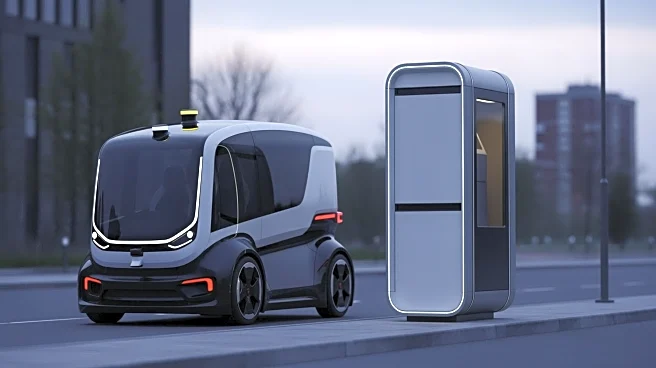What's Happening?
Waymo has announced a strategic, multi-year partnership with DoorDash to test autonomous delivery services in Phoenix. The service will match DoorDash customers ordering food and groceries within a 315-square-mile
area with a self-driving Waymo vehicle. Initially, deliveries will be made from DashMart, DoorDash's convenience and grocery stores, with plans to expand to more local merchants over time. This collaboration marks Waymo's re-entry into the delivery market, leveraging its fleet of driverless Jaguar I-Pace vehicles.
Why It's Important?
This partnership is a pivotal moment for both Waymo and DoorDash, as it explores the integration of autonomous technology into everyday commerce. For Waymo, it provides an opportunity to diversify its business model beyond passenger transport, potentially increasing fleet utilization and operational efficiency. DoorDash benefits by offering a novel delivery experience, enhancing its service offerings in a competitive market. The collaboration could set a precedent for other companies to adopt autonomous delivery solutions, influencing the future of logistics and urban mobility.
What's Next?
As the pilot progresses, Waymo and DoorDash aim to include more local retailers in the delivery service, expanding the range of products available for autonomous delivery. The success of this initiative could lead to broader adoption in other cities, potentially reshaping urban delivery systems. Stakeholders, including local businesses and consumers, will be observing the service's impact on delivery efficiency and customer satisfaction. The partnership may also encourage other companies to explore similar autonomous solutions, driving innovation in the logistics sector.
Beyond the Headlines
The deployment of autonomous delivery vehicles raises important considerations regarding job displacement and the ethical implications of automation. While the technology promises increased efficiency, it may also impact traditional delivery roles, necessitating discussions on workforce adaptation. Additionally, the reliance on autonomous systems requires robust cybersecurity measures to prevent potential vulnerabilities. As the technology advances, regulatory frameworks will need to evolve to address safety, privacy, and data security concerns.









